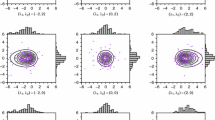Abstract
A finite mixture model using the multivariate t distribution has been well recognized as a robust extension of Gaussian mixtures. This paper presents an efficient PX-EM algorithm for supervised learning of multivariate t mixture models in the presence of missing values. To simplify the development of new theoretic results and facilitate the implementation of the PX-EM algorithm, two auxiliary indicator matrices are incorporated into the model and shown to be effective. The proposed methodology is a flexible mixture analyzer that allows practitioners to handle real-world multivariate data sets with complex missing patterns in a more efficient manner. The performance of computational aspects is investigated through a simulation study and the procedure is also applied to the analysis of real data with varying proportions of synthetic missing values.
Similar content being viewed by others
References
Basford KE, McLachlan GJ (1985) Estimation of allocation rates in a cluster analysis context. J Am Stat Assoc 80: 286–293
Bensmail H, Celeux G, Raftery AE, Robert CP (1997) Inference in model-based cluster analysis. Stat Comput 7: 1–10
Brooks SP, Giudici P, Roberts GO (2003) Efficient construction of reversible jump Markov chain Monte Carlo proposal distributions (with discussion). J R Stat Soc Ser B 65: 3–55
Campbell NA, Mahon RJ (1974) A multivariate study of variation in two species of rock crab of genus Leptograpsus. Aust J Zool 22: 417–425
Chib S, Greenberg E (1995) Understanding the Metropolis–Hastings algorithm. Am Stat 49: 327–335
Dellaportas P, Papageorgiou I (2006) Multivariate mixtures of normals with unknown number of components. Stat Comput 16: 57–68
Dempster AP, Laird NM, Rubin DB (1977) Maximum likelihood from incomplete data via the EM algorithm (with discussion). J R Stat Soc Ser B 39: 1–38
Diebolt J, Robert CP (1994) Estimation of finite mixture distributions through Bayesian sampling. J R Stat Soc Ser B 56: 363–375
Escobar MD, West M (1995) Bayesian density estimation and inference using mixtures. J Am Stat Assoc 90: 577–588
Frühwirth-Schnatter S (2006) Finite mixture and Markov switching models. Springer, New York
Ghahramani Z, Jordan MI (1994) Supervised learning from incomplete data via an EM approach. In: Cowan JD, Tesarro G, Alspector J (eds) Advances in neural information processing systems, vol 6. Morgan Kaufmann, San Francisco, pp 120–127
Green PJ (1995) Reversible jump Markov chain Monte Carlo computation and Bayesian model determination. Biometrika 82: 711–732
Hastings WK (1970) Monte Carlo sampling methods using Markov chains and their applications. Biometrika 57: 97–109
Lin TI, Lee JC, Ho HJ (2006) On fast supervised learning for normal mixture models with missing information. Pattern Recogn 39: 1177–1187
Lin TI, Lee JC, Ni HF (2004) Bayesian analysis of mixture modelling using the multivariate t distribution. Stat Comput 14: 119–130
Little RJA, Rubin DB (2002) Statistical analysis with missing data, 2nd edn. Wiley, New York
Liu CH, Rubin DB (1994) The ECME algorithm: a simple extension of EM and ECM with faster monotone convergence. Biometrika 81: 633–648
Liu CH, Rubin DB (1995) ML estimation of the t distribution using EM and its extensions, ECM and ECME. Stat Sin 5: 19–39
Liu CH, Rubin DB, Wu YN (1998) Parameter expansion to accelerate EM: the PX-EM algorithm. Biometrika 85: 755–770
McLachlan GJ, Basford KE (1988) Mixture models: inference and application to clustering. Marcel Dekker, New York
McLachlan GJ, Peel D (2000) Finite mixture models. Wiely, New York
Meng XL, Rubin DB (1993) Maximum likelihood estimation via the ECM algorithm: a general framework. Biometrika 80: 267–278
Meng XL, van Dyk D (1997) The EM algorithm—an old folk song sung to a fast new tune (with discussion). J R Stat Soc Ser B 59: 511–567
Peel D, McLachlan GJ (2000) Robust mixture modeling using the t distribution. Stat Comput 10: 339–348
Richardson S, Green PJ (1997) On Bayesian analysis of mixtures with an unknown number of components. J R Stat Soc Ser B 59: 731–792
Rubin DB (1976) Inference and missing data. Biometrika 63: 581–592
Schafer JL (1997) Analysis of incomplete multivariate data. Chapman and Hall, London
Shoham S (2002) Robust clustering by deterministic agglomeration EM of mixtures of multivariate t-distributions. Pattern Recogn 35: 1127–1142
Shoham S, Fellows MR, Normann RA (2003) Robust, automatic spike sorting using mixtures of multivariate t-distributions. J Neurosci Methods 127: 111–122
Stone M (1974) Cross-validatory choice and assessment of statistical prediction (with discussion). J R Stat Soc Ser B 36: 111–147
Titterington DM, Smith AFM, Markov UE (1985) Statistical analysis of finite mixture distributions. Wiely, New York
Wang HX, Zhang QB, Luo B, Wei S (2004) Robust mixture modelling using multivariate t distribution with missing information. Pattern Recogn Lett 25: 701–710
Zhang ZH, Chan KL, Wu YM, Chen CB (2004) Learning a multivariate gaussian mixture model with the reversible jump MCMC algorithm. Stat Comput 14: 343–355
Author information
Authors and Affiliations
Corresponding author
Rights and permissions
About this article
Cite this article
Lin, TI., Ho, H.J. & Shen, P.S. Computationally efficient learning of multivariate t mixture models with missing information. Comput Stat 24, 375–392 (2009). https://doi.org/10.1007/s00180-008-0129-5
Received:
Accepted:
Published:
Issue Date:
DOI: https://doi.org/10.1007/s00180-008-0129-5




